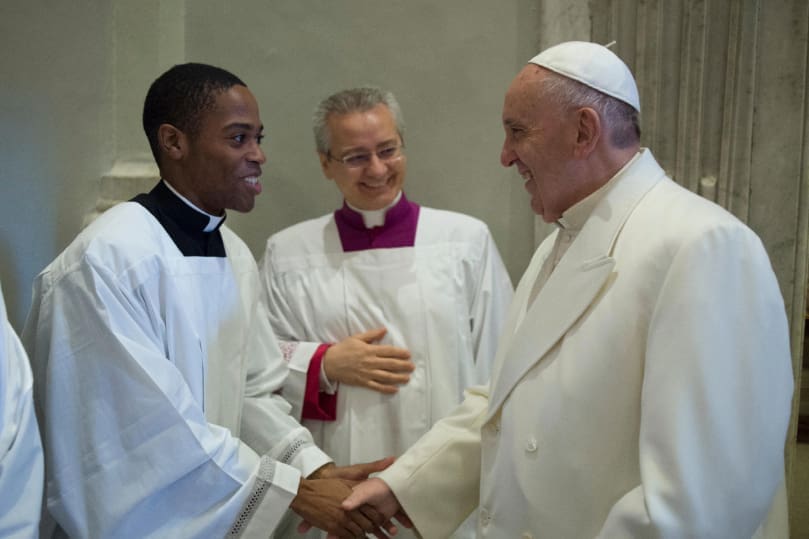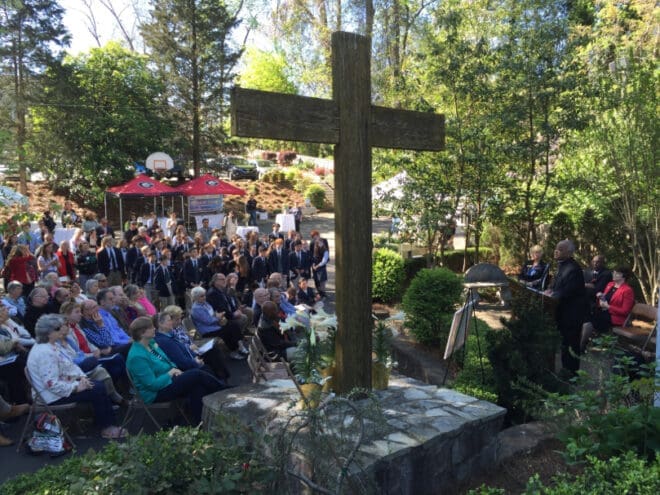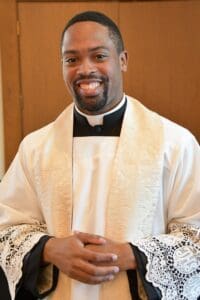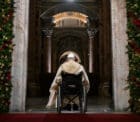 Photo Courtesy of Father Avery Daniel
Photo Courtesy of Father Avery DanielAtlanta
Atlantans remember Pope Francis for mercy, bold initiatives and art of encounter
By ANDREW NELSON, Staff Writer | Published April 24, 2025 | En Español
ATLANTA—Avery Daniel was a seminarian studying in Rome when he was invited to be an altar server for a papal Mass in St. Peter’s Basilica. As he stood near the altar of the famous Pietà with the Mass vestments laid out “a big flash of white” appeared.
Just moments earlier, a Vatican photographer wanted him to be a stand-in for Pope Francis to check his camera equipment.
The pontiff overheard and joked with the then 22-year-old, asking if he was going to be his replacement for Mass so he could leave. The two exchanged light-hearted jokes in Italian.
For Father Daniel, now a parochial vicar at St. Benedict Church in Johns Creek, the 2015 encounter is a treasured memory. It’s one he memorialized by sharing the photo on his Facebook page.
The pope’s quip immediately put me at ease, said Father Daniel. But more than the humor, it was the care shown toward the young seminarian, new to the language, Father Daniel remembered.
“The first thing on his mind was the person in front of him,” he said about Pope Francis.
As the church prepares for the funeral of the first pope from Latin America, Atlanta believers shared how his ministry of mercy and mission shaped their faith, from environmental protection to valuing men and women on the margins of the church and society.
A lesson in mercy
Father Luke Ballman witnessed the white smoke from the Vatican in 2013 when Pope Francis was elected. He was then serving at the Pontifical North American College, helping seminarians on their path to the priesthood.
Pope Francis has shown Catholics cannot simply preach mercy but must live it, wrote Father Ballman, now the pastor of Atlanta’s Holy Spirit Church.
As the late pope described the church serving the world as a field hospital, he “prioritized mercy, pastoral outreach and walking with people in their struggles,” said Father Ballman.
For him, Pope Francis will be remembered as a “great pastoral leader” whose gift was to make the Gospel more accessible to those who feel distant from the church, he said. The pope’s work “reminds us the church is not a fortress for the perfect, but a home for all who seek Christ.”
Through acts like washing the feet on Holy Thursday of prisoners, Muslims and women, and commissioning sculptures such as “Homeless Jesus” and “Angels Unawares,” the pope brought the plight of migrants, the poor, the LGBTQ+ community into the church’s heart, said Father Ballman.
Through bold initiatives, Pope Francis “ensured that the struggles of the marginalized are impossible to ignore.”
Father Vic Galier, who works with retired archdiocesan priests, has been on sabbatical in Rome for the past few months. He said the death left a pall over the city.
“Something has changed. Some joy is gone,” he said in a video message. “It’s a different day here in Rome. Something’s changed, but we continue to rely in hope on the mercy and love of God as we pray for Pope Francis after his death.”
Care for creation and others
In June 2015, Pope Francis released Laudato si’, the encyclical on the care of creation. He emphasized how it is the poor who often suffer first in the face of environmental disasters.

A 2016 celebration of the Action Plan for the Archdiocese of Atlanta on Pope Francis’ encyclical “Laudato Si’: On Care for Our Common Home” took place in the garden at the Catholic Center of the University of Georgia. Then-Archbishop Wilton D. Gregory was one of the speakers at the event, which included scientists, students and members of the interfaith community. Photo by David Pace
Local environmentalists and scientists used Laudato si’ as the foundation to tackle regional challenges. Across Georgia, their plan used the lens of faith to examine the impact of higher temperatures and increased chances of coastal flooding. It encouraged the faith community to “start the urgent and important spiritual work of reversing the threat of global climate change and environmental degradation and living more sustainably in harmony with God’s creation.”
Lead author Susan Varlamoff said the pope’s inspiring words and insight started a “global movement.”
“Pope Francis will be remembered for his humility and his call to protect our common home in Laudato si’, which ignited a global movement to safeguard God’s creation for future generations,” she said. His contribution was to add “a moral dimension to environmental protection.”
Varlamoff and her colleagues at the University of Georgia created a plan to help families, parishes and schools lower their carbon footprint and live out the pope’s vision, she said. Originating in Atlanta, the plan later became a template for dioceses across the country, said Varlamoff, a member of St. John Neumann Church, Lilburn. Pope Francis’ environmental legacy is assured with a culture of caring for the earth and each other in our parishes and communities, she said.
A dozen churches and schools in the Archdiocese of Atlanta had energy and water audits conducted, supported by Georgia Interfaith Power and Light, to help them be better stewards of the environment, among other efforts.

Father Avery Daniel is pictured on his ordination day. Photo by Jackie Holcombe
Engage and encounter
Seven years after sharing jokes with the pope, Father Avery Daniel was ordained a priest. Those minutes with Pope Francis continue to ripple through his ministry.
Father Daniel said the pope “empowered” him to reach out to those who feel there isn’t a place in the church for them. Repeatedly, the pope spoke about how the church is for “todos, todos, todos (everyone, everyone, everyone),” said the priest.
Father Daniel welcomed a brief assignment as a deacon to learn Spanish in Guatemala. Once there, he opened himself up to new experiences, trusting the Holy Spirit. Soon he was riding on the back of motorcycles to unknown villages to perform baptisms and witness weddings. Pope Francis showed how ministry goes beyond parish events by engaging with friends and people from all walks of life wherever there is a need, he said.
Father Daniel said the pope was “always talking about encounter and encountering the other, reaching out to the other, not looking down on the other, unless you’re pulling them up off the ground.”
